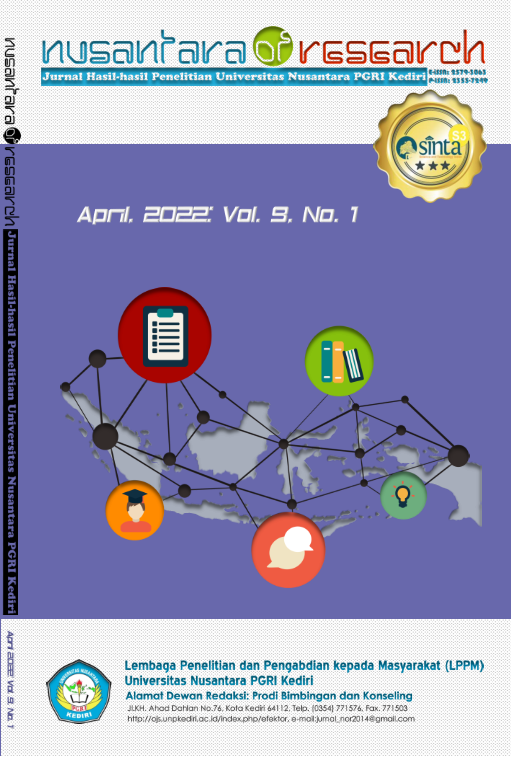Halo BK Program: Guidance and Counseling Service Solutions During the Covid-19 Pandemic
Main Article Content
Abstract
The Halo BK program is an online or online-based guidance and counseling service activity that is packaged in the VOS Podcast discussion technique by utilizing Youtube TV, VOS radio, and VOS TV media. The Halo BK program provides various information and assistance on personal, social, learning, and career aspects and helps students identify themselves (self-concept), get to know the environment, and plan for the future. The research method uses qualitative research, with the type of literature study. The objectives of the Halo BK program are: (1) Helping students gain an understanding of the information provided, (2) Helping students use the information to help solve problems, (3) Helping students become more independent, (4) Helping students to think positive and objective in adapting to their environment, (5) Helping students to be able to make decisions, (6) Helping students being able to direct themselves according to their needs (7) Helping students being able to actualize themselves.
Downloads
Article Details
Issue
Section
Authors who publish with this journal agree to the following terms:
- Copyright on any article is retained by the author(s).
- The author grants the journal, the right of first publication with the work simultaneously licensed under a Creative Commons Attribution License that allows others to share the work with an acknowledgment of the work’s authorship and initial publication in this journal.
- Authors are able to enter into separate, additional contractual arrangements for the non-exclusive distribution of the journal’s published version of the work (e.g., post it to an institutional repository or publish it in a book), with an acknowledgment of its initial publication in this journal.
- Authors are permitted and encouraged to post their work online (e.g., in institutional repositories or on their website) prior to and during the submission process, as it can lead to productive exchanges, as well as earlier and greater citation of published work.
- The article and any associated published material is distributed under the Creative Commons Attribution-ShareAlike 4.0 International License
How to Cite
References
Creswell, J. W. (2014). A concise introduction to mixed methods research. SAGE publications.
Finn, J., & Barak, A. (2010). A descriptive study of e-counsellor attitudes, ethics, and practice. Counselling and Psychotherapy Research, 10(4), 268-277.
Habsy, B. A. (2017). Seni memehami penelitian kuliatatif dalam bimbingan dan konseling: studi literatur. Jurnal Konseling Andi Matappa, 1(2), 90-100.
Habsy, B. A. (2020). Kajian Filosofis Ditengah Pandemi Covid-19 Berdasarkan ParadigmaKonseling Catur Murti. Nusantara of Research: Jurnal Hasil-hasil Penelitian Universitas Nusantara PGRI Kediri, 7(1), 19-29.
Haniza, N., & Iskandar, A. (2018, October). Mengatasi Hambatan Bimbingan Konseling di Sekolah Melalui Layanan Berbasis ICT. In Seminar Konseling 2017. Fakultas Ilmu Pendidikan UNP.
Muara, T., Prasetyo, T. B., & Rahmat, H. K. (2021). Psikologi Masyarakat Indonesia di Tengah Pandemi: Sebuah Studi Analisis Kondisi Psikologis Menghadapi COVID-19 Perspektif Comfort Zone Theory. Ristekdik: Jurnal Bimbingan dan Konseling, 6(1), 69-77.
Nisa, N., Arifin, M., Nur, M. F., Adella, S., & Marthoenis, M. (2020). Indonesian online newspaper reporting of suicidal behavior: Compliance with World Health Organization media guidelines. International Journal of Social Psychiatry, 66(3), 259-262.
Pelling, N. J. (2009). The use of email and the Internet in counselling and psychological service: what practitioners need to know.
Permendiknas, R. I. No. 22. (2006). Standar Isi Untuk Satuan Pendidikan Dasar dan Menengah Dengan Rahmat Tuhan Yang Maha Esa.
Permendikbud Nomor 111 Tahun 2014 Tentang Bimbingan Dan Konseling Di Pendidikan Menengah
Prawitasari, I. (2020). Implementasi Pelaksanaan Bimbingan Dan Konseling Di Masa Pandemi Covid-19: A Literature Review. Syi’ar: Jurnal Ilmu Komunikasi, Penyuluhan Dan Bimbingan Masyarakat Islam, 3(2), 123-130.
Putri, V. D. (2020). Layanan bimbingan dan konseling daring selama masa pandemi COVID-19. Coution: journal of counseling and education, 1(2), 7-16.
Sampson, J. P., & Makela, J. P. (2014). Ethical issues associated with information and communication technology in counseling and guidance. International Journal for Educational and Vocational Guidance, 14(1), 135-148.
Sisdiknas, U. U. (2003). UU No. 20 tahun 2003. Departemen Agama RI, Jakarta.
Sharifi, M., Dryden, E. M., Horan, C. M., Price, S., Marshall, R., Hacker, & Taveras, E. M. (2013). Leveraging text messaging and mobile technology to support pediatric obesity-related behavior change: a qualitative study using parent focus groups and interviews. Journal of Medical Internet Research, 15(12), e2780.
Wibowo, D. M. L. M. E., & Tadjri, I. (2013). Pengembangan modul bimbingan karir berbasis multimedia interaktif untuk meningkatkan kematangan karir siswa. Jurnal Bimbingan Konseling, 2(1).
Winkel, W. S. (1987). Bimbingan dan praktek konseling dan psikoterapi. Jakarta, Indonesia: PT. Gramedia.
Wisman, W., & Kurniawan, R. (2020). Pengembangan Media Pembelajaran Keterampilan Menyimak Berbasis Online Menggunakan Google Form dan Google Classroom. Silampari Bisa: Jurnal Penelitian Pendidikan Bahasa Indonesia, Daerah, Dan Asing, 3(2), 289-309.




